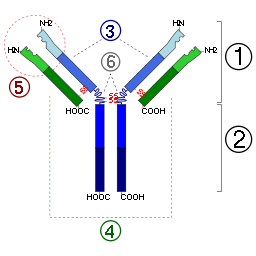 It has been long recognized that IVIG–given for a variety of immune-mediated diseases and infections–has been associated with hyponatremia. In the recent “Electrolytes” edition of Neph-Sap, their explanation is a multifactorial one:
It has been long recognized that IVIG–given for a variety of immune-mediated diseases and infections–has been associated with hyponatremia. In the recent “Electrolytes” edition of Neph-Sap, their explanation is a multifactorial one:
1. pseudohyponatremia: there is a massive protein load in an IVIG infusion (in the form of immunoglobulins), and as a result the protein phase of serum is higher. Depending on the type of laboratory test used to determine serum sodium concentration, the Na may or may not be read as low.
2. hypertonic hyponatremia: most IVIG preparations contain significant amounts of sucrose or maltose–whose presence is necessary to prevent aggregation of Ig molecules–and the resultant increase in serum osmolality will result in the efflux of water out of cells into the extracellular fluid compartment, thereby lowering serum sodium. The mechanism is similar to hyperglycemic hyponatremia or mannitol-induced hyponatremia.
3. true dilutional hyponatremia: the total volume of the IVIG infusion may be significant enough to cause dilutational hyponatremia, in large part because the high oncotic pressure allows for the solute to be retained intravascularly for prolonged periods of time.


hyponatremia hypocalcemia hypo phos any ideas